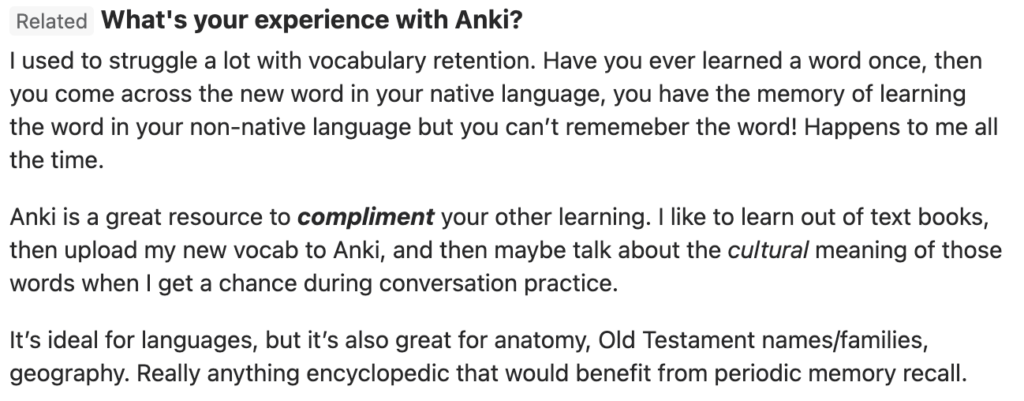Anki Review – How Helpful Is it?
How Anki Works
Anki is a powerful and versatile tool for learning and retaining information. At its core, Anki is a flashcard system that uses spaced repetition to help you remember what you’ve learned over time. When you create a new deck of flashcards, Anki uses an algorithm to schedule them for review based on how well you’ve remembered them in the past. Cards that you struggle with will appear more frequently, while those you remember well will be spaced out over longer intervals.
What makes Anki so effective is its use of spaced repetition. Instead of cramming information into your brain all at once, Anki presents information in bite-sized chunks at intervals that are scientifically proven to optimise long-term memory retention. By spacing out your review sessions over time, Anki helps to move information from short-term memory into long-term memory, where it can be accessed more easily and used more effectively.
Anki’s Features

Anki is a powerful spaced repetition software that comes packed with a range of features designed to make language learning and memorisation a breeze. Here are some of Anki’s most useful features:
- ✅ Customisable Decks. Anki allows you to create customizable decks of flashcards that can be tailored to your specific learning needs. This means you can focus on the areas of a language that you struggle with the most.
- ✅ Spaced Repetition. Anki’s spaced repetition algorithm ensures that you see each card at the optimal time for maximum retention. This means that you’re not wasting time reviewing information that you already know well and can focus on learning new material.
- ✅ Image and Audio Support. Anki allows you to add images and audio to your flashcards, which is particularly useful for language learning. You can also record your own audio and add it to your cards, allowing you to practice pronunciation.
- ✅ Mobile Sync. Anki offers mobile apps that sync with your desktop program, allowing you to study on the go. This means you can easily make use of downtime, such as during your daily commute or waiting in line, to study.
- ✅ Add-ons. Anki has a vast collection of add-ons created by its active community of users. These add-ons can help you enhance your Anki experience by adding new features or customizing existing ones.
These features make it a powerful tool for language learning and memorisation. Whether you’re learning a new language or studying for an exam, Anki has everything you need to make the learning process easier and more effective.
Benefits of Using Anki
Using Anki can have a multitude of benefits for learners of all types. Whether you’re a student trying to memorise vocabulary, a professional looking to retain important information, or just someone interested in expanding your knowledge, Anki can help. Here are some of the key benefits of using Anki as part of your learning routine.
- ✏️ Efficient learning. Anki’s spaced repetition algorithm helps you retain information better by showing you cards at the optimal time for review.
- ✏️ Customisable. Anki allows you to create your own flashcards with text, images, and even audio. You can also customize your card decks and study options to suit your needs.
- ✏️ Accessibility. Anki is available for free on multiple platforms, including desktop, web, and mobile devices, making it easy to use and accessible wherever you are.
- ✏️ Time-saving. Anki’s automatic scheduling and review system means you don’t have to spend time figuring out when to review each card. Anki does the work for you, saving you time and energy.
- ✏️ Track progress. Anki allows you to track your progress over time, making it easy to see how much you’ve learned and how well you’re retaining information.
- ✏️ Adaptable. Anki can be used for a variety of subjects, from language learning to medical school exams. Its flexibility makes it a valuable tool for any learner, regardless of their area of study.
- ✏️ Fun and engaging: Anki’s gamified approach to learning can make the process of studying feel less daunting and more enjoyable. With its customizable features, you can make learning a fun and engaging experience.
Drawbacks of Using Anki
While Anki has numerous benefits, it’s important to acknowledge that there are also some potential drawbacks to using the program. Here are a few to consider:
- ❌ Steep Learning Curve. Anki’s interface can be intimidating for beginners, and it takes time to learn how to create effective flashcards and navigate the program.
- ❌ Time-Consuming. Anki requires a significant time commitment, especially when you’re first starting out. Creating high-quality flashcards can be time-consuming, and daily review sessions can take up a considerable amount of time.
- ❌ Limited Subject Matter. While Anki can be used to study virtually any subject, it’s best suited for memorizing facts and information. It may not be the best tool for subjects that require deeper understanding and analysis.
- ❌ Monotonous. Some users may find the process of reviewing flashcards to be tedious and monotonous, leading to decreased motivation and engagement over time.
It’s important to weigh the benefits and drawbacks of Anki to determine whether it’s the right study tool for you.
Tips for Using Anki Effectively
Sure, using Anki can be an effective way to retain information for long periods of time, but it’s important to use it effectively in order to get the most out of it. Here are some tips to help you use Anki effectively and efficiently:
- ✏️ Create high-quality flashcards. The effectiveness of Anki largely depends on the quality of your flashcards. Make sure your cards are clear, concise, and well-formulated to ensure optimal retention and recall.
- ✏️ Use spaced repetition. Anki’s spaced repetition algorithm is designed to optimize retention by showing you cards at intervals that maximize your chances of remembering them. Make sure you take advantage of this feature by reviewing your cards regularly.
- ✏️ Prioritise active recall. Active recall, or the process of trying to remember information from memory, is a powerful tool for strengthening long-term memory. Make sure your flashcards are designed to encourage active recall rather than passive recognition.
- ✏️ Take advantage of multimedia. Anki supports a variety of multimedia formats, including images, audio, and video. Incorporating multimedia into your flashcards can make them more engaging and memorable.
- ✏️ Be consistent. Consistency is key when it comes to using Anki effectively. Make reviewing your cards a regular habit and stick to a schedule that works for you.
By following these tips, you can get the most out of Anki and optimize your learning and retention.
Is Anki Helpful for GCSE and A-level Students?
Anki can be a powerful tool for students at all levels, including those studying for GCSE and A-level exams. With the ability to create custom decks and study materials, students can tailor their use of Anki to their specific needs and subjects.
Additionally, the spaced repetition algorithm used by Anki is based on scientific research into how the brain processes and retains information, making it a potentially valuable aid for students looking to improve their long-term retention of course materials.
However, it’s important to note that Anki should not be relied upon as the sole method of studying for exams. It should be used in conjunction with other study methods, such as reading textbooks, attending lectures, and completing practice problems. Additionally, students should be careful not to over-rely on Anki’s algorithm to determine their study schedule, and should make adjustments as needed to ensure they are adequately preparing for exams.
Here are some reviews for Anki:


Final Thoughts
In conclusion, Anki can be an extremely useful tool for students looking to improve their memory and retention of information. Its powerful algorithm, customisable options, and active community make it a top choice for many learners. However, it’s important to keep in mind that Anki is just one tool in the student’s toolkit, and it may not be suitable for everyone. Additionally, it’s essential to use Anki effectively by following the tips we outlined earlier and being mindful of its drawbacks.
At the same time, students who need additional help with their studying and revision should know that they don’t have to go it alone. Edumentors, an online tutoring company, offers personalised support to students at all levels. These experienced tutors can help you overcome your learning challenges and achieve your academic goals. So, if you need extra help with your studies, don’t hesitate to reach out to Edumentors.








